As wild animals and as companions to humans, falcons are best known for their incredible hunting skills. Swift and deadly on the wing, the falcon is associated with speed, acuity, strength, and skill. The history of humans and falcons together is long and storied with cultures all over the world engaging in this ancient hunting practice.
In this article, we’ll examine the history of falconry, the mythology connected with falcons across various cultures, and the many fascinating lessons that we can learn from these incredible birds of prey. Read on to learn all about the wisdom of the falcon!
Table of contents
Falcon Symbolism and Meaning
You might not know it today, but the iconic Peregrine Falcon once came very close to vanishing from the United States. Thanks to the widespread use of DDT, a now-banned pesticide which is recognized for causing steep population declines in several American bird species during the mid-twentieth century, Peregrine Falcons were unable to sustain their previous populations. DDT affects the way that birds’ bodies metabolize and distribute calcium. This means that birds with high exposure to DDT, like those at the top of the food chain, could not produce eggshells strong enough to withstand the weight of the incubating parent, or even the chick inside. By 1975, only 324 pairs of Peregrine Falcons remained in the entirety of the United States. Around that time, though, DDT was finally banned and conservation efforts began to focus on the dwindling Peregrine population. Captive-raised birds were reintroduced to the wild and closely monitored. It took a while, but by the 1999, the Peregrine Falcon had made one of the most incredible comebacks in the history of wildlife conservation. They were removed from the endangered species list and remain a ubiquitous presence in much of the United States to this day. The Peregrine Falcon is a major symbol of conservation, environmental responsibility, and hope. (1)
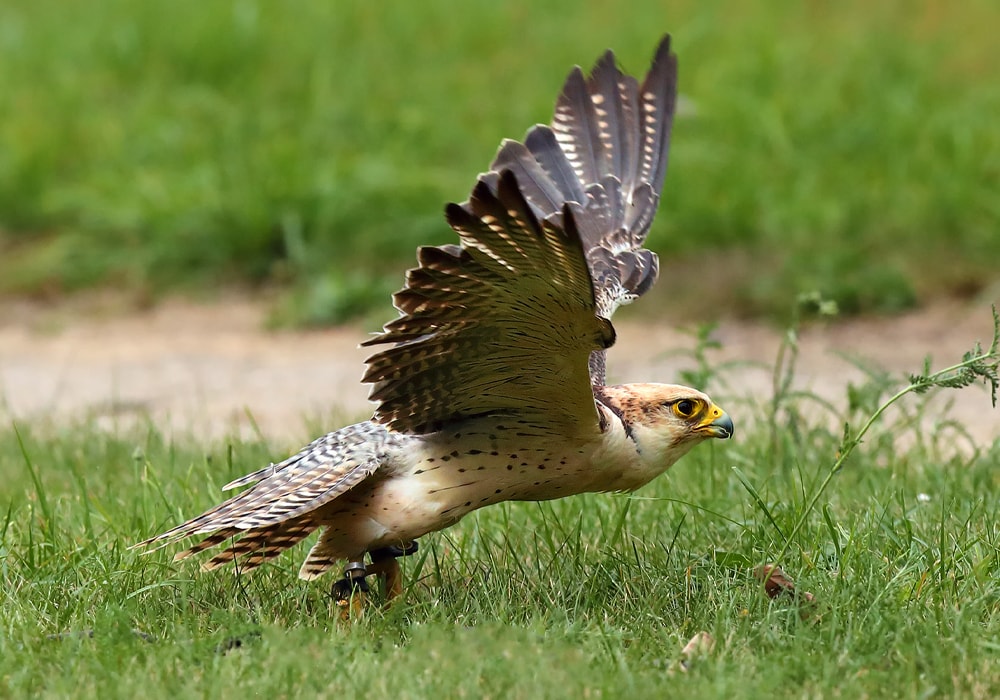
The name “Peregrine” comes from “peregrin,” which is Latin for “traveler.” This name is given to these falcons because of their exceedingly long migration routes. Peregrine Falcons may represent travel, adventure, navigation, pilgrimages, or safe homecomings. (2)
The practice of falconry is at least three thousand years old. Dating back to ancient Egypt and the Asian Steppes, falconry as a practice involves the domestication of falcons, and a few other types of birds of prey, for the purpose of hunting small game for sport. Falcons are generally used to catch smaller species of birds while some birds of prey are used to catch rabbits or squirrels. (3)
“An Eagle for an Emperor, a Gyrfalcon for a King; a Peregrine for a Prince, a Saker for a Knight, a Merlin for a Lady; a Goshawk for a Yeoman, a Sparrowhawk for a Priest, a Musket for a Holy water Clerk, a Kestrel for a Knave.”
— The Book of Saint Albans c. 1486 (4)
This selection from a medieval manuscript describes the different social roles that are connected with the different birds that are used in falconry. In general, falconry has very often been thought of as a noble pastime; a sport intended for princes and aristocrats. This is not reflective of its entire history, though. Regardless, falcons and falconry retain a reputation for nobility and regality.
One of the common bits of imagery associated with falcons is the falconer’s hood. These tiny hoods are fitted over the faces of falcons in order to cover their eyes. Although these hoods render the falcon blind until they are removed, they are actually used for the bird’s well-being. The hoods keep falcons calm and prevent them from suffering from undue stress. Because falcons are such visual hunters, they do not react to danger if they cannot see it. This makes them quite tame while blindfolded. A falconer’s hood may represent relaxation, trust, and obliviousness. (5)
Falcons are sometimes considered to be the fastest animals in the entire world. Peregrine Falcons can get as fast as 242 miles per hour while diving for their prey. Furthermore, the vision of falcons is thought to be acute enough to spot prey from up to two miles away. Falcons are unbelievably talented animals with incredible natural power. Falcons may represent the limits of one’ ability; the incredible depths of potential that humans and animals are capable of reaching. Falcons represent superlatives. They represent speed, power, and superhuman ability. (6)
Falcon Native American Symbolism
In most Native American traditions, falcons represent courage, strength, protection, and vigilance.
According to one Native American myth, the first falcons were born from a man who fell in love with a maiden who descended from the realm of the stars. The star maiden was one of several sisters who traveled to earth every day to dance together. One day, a great hunter named Waupee witnessed the sisters dancing. He fell in love with the youngest maiden and resolved to marry her. Unfortunately, whenever he approached the sisters, they became scared and fled from him. Waupee devised a plan. (7)
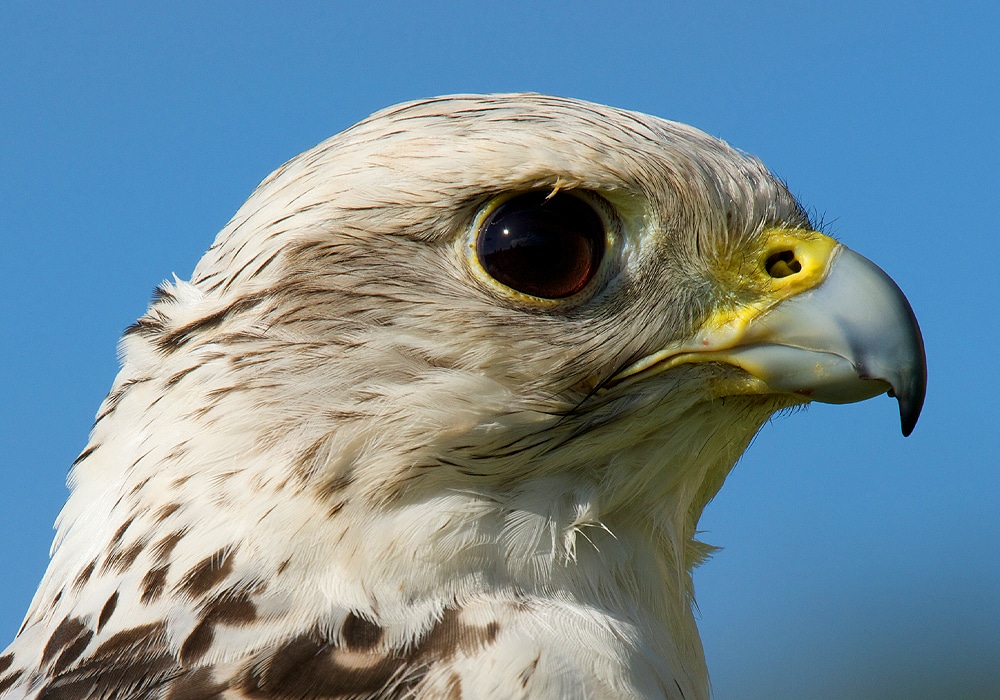
One day, Waupee concealed himself with a group of mice inside of a stump. When the sisters came to the earth, they began chasing the mice and Waupee seized his chance to capture the youngest sister. Although the maiden was his captive, she eventually fell in love with Waupee and the two had a son together. One day, the star maiden felt sad and missed her home amongst the stars, so she brought her son up to the heavens to meet his grandfather. When Waupee saw that they were gone, he was heartbroken. Then, the star chief gave Waupee a mission. He ordered Waupee to hunt each animal on the earth and bring a piece of their body to the stars. When this was done, the star people each chose an animal part and became the animal which they chose. As a reward for his incredible feat, Waupee was given his choice of the animals. Waupee and his wife and son selected falcon feathers and the three became falcons. (8)
Falcon Eastern Symbolism
“Takagari” is the Japanese word for falconry. Traditionally, falconry was practiced in Japan as a noble sport reserved for men of status. For this reason, falcons are often thought of as symbols of status, wealth, and nobility.
According to one Japanese myth, a falcon with a tail made of swords once terrorized the Koya region. In response to the predation by this monster, a fine prince was sent to Koya to slay the beast. While in Koya, the prince took months to locate the falcon, which was tricky and evasive. Because he spent so long in the town, the prince came to know the townspeople and fell in love with a young woman there. Then, the prince finally slew the vicious falcon. The prince’s lover was heartbroken, because she knew that the prince would not have to stay in Koya anymore. The prince’s lover committed suicide in her heartbreak and blamed the death of the falcon for taking her lover away. (9)
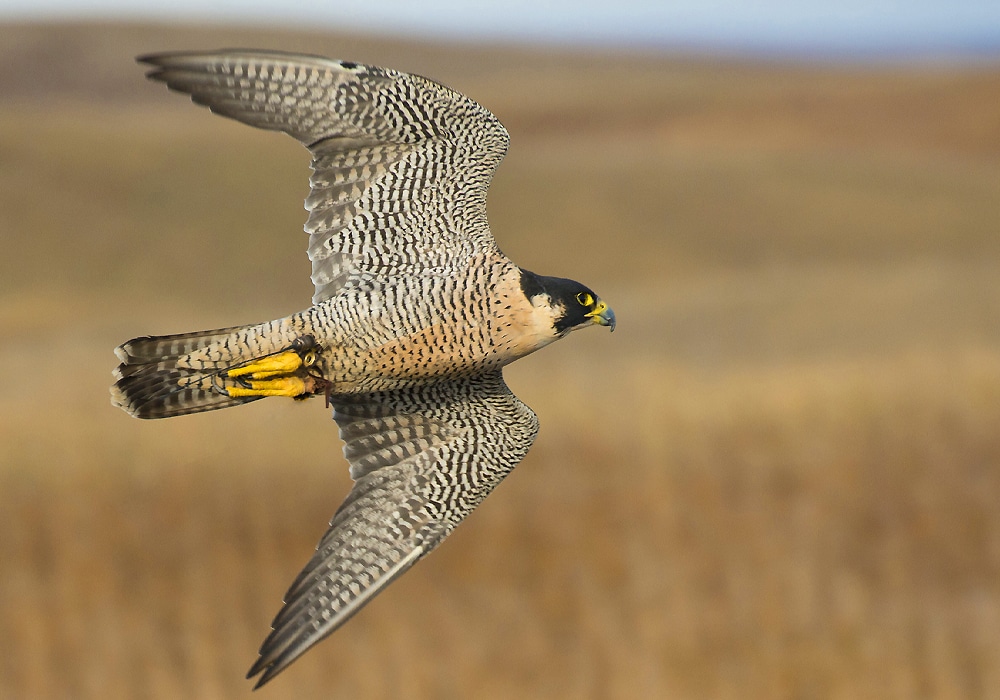
Falcon Christianity symbolism
Falcons do not appear in the Bible itself, but many birds of prey are found throughout Christian imagery. (10)
“Doth the hawk fly by thy wisdom, and stretch her wings toward the south? Doth the eagle mount up at thy command, and make her nest on high? She dwelleth and abideth on the rock, upon the crag of the rock, and the strong place. From thence she seeketh the prey, and her eyes behold afar off.”
–Job 39:26-29 (11)
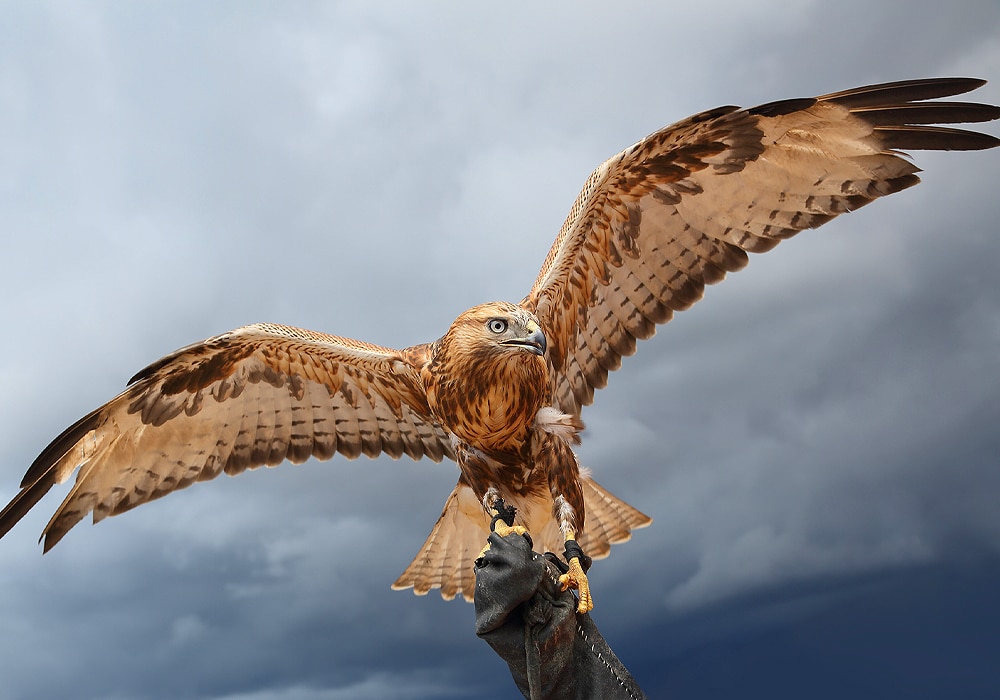
Falcons may then represent the natural order of the world as set forth by God.
Falcon Celtic Symbolism
One Celtic myth describes a man who has lived for many many centuries in a variety of forms. When the man’s life has begun to grow too long and melancholy for him to be able to bear, the man pours his heart out to a hawk who reveals itself to have lived for centuries as well. The two ancient beings describe their long lives to each other as well as the ways that their lives have intertwined over the centuries. After sharing their stories, the two beings finally die. (12)
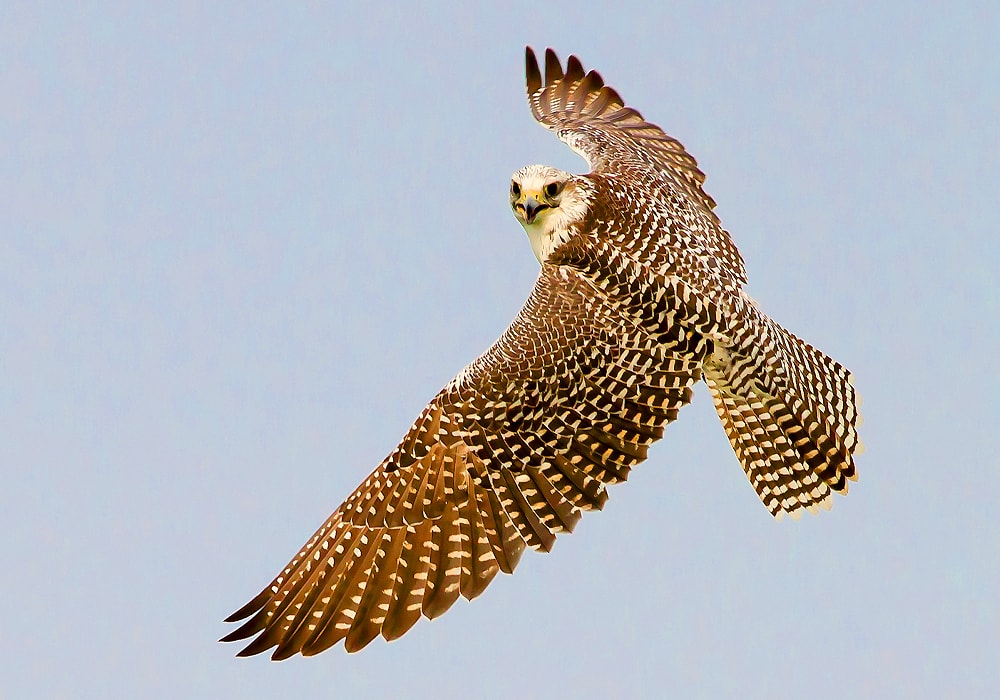
Although this story includes a hawk, rather than a falcon, falcons can still be connected with wisdom, age, longevity, and knowledge. (13)
Falcon African Symbolism
The Egyptian god, Horus, is usually represented as a humanoid with a falcon’s head. The falcon is one of the most important Egyptian symbols. It is even said that falconry originated in ancient Egypt.
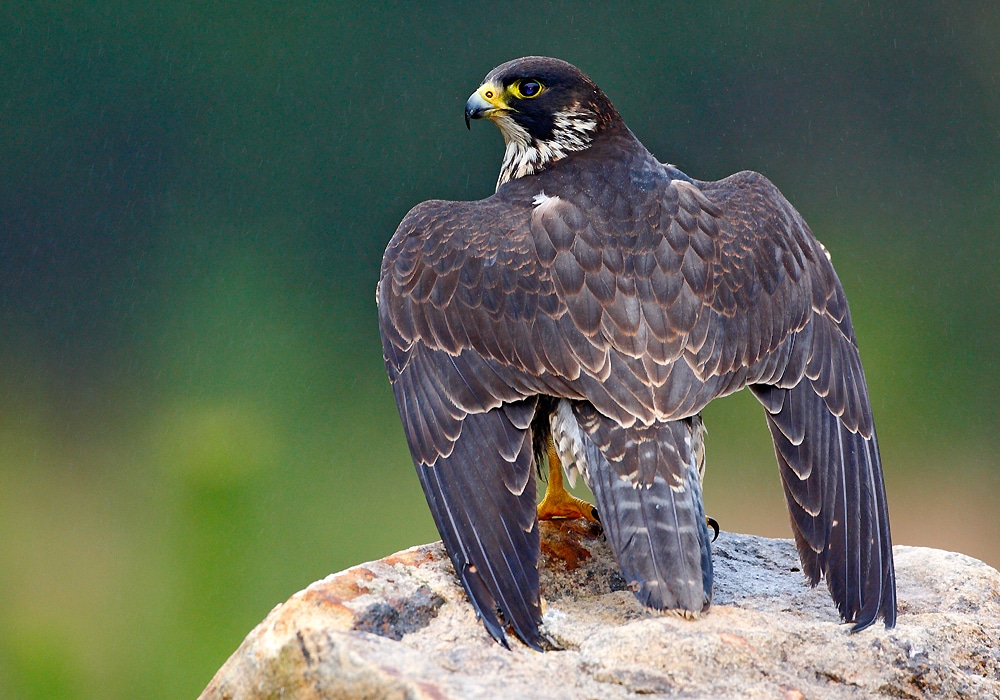
Horus is the divine son of Isis and Osiris. Osiris is the king of the land of the dead who was murdered by his jealous brother. Horus is said to be the rightful king of creation and the destined opponent of the evils of the world. The “Eye of Horus” is often used as a symbol of vision, protection, kingship, or vigilance. (14)
Falcon in Dreams
Dreaming of falcons may represent one’s goals or talent. Falcons are often thought of as symbols of achievement and ability. Dreaming of a falcon in flight might indicate single-minded focus upon one’s ambitions.
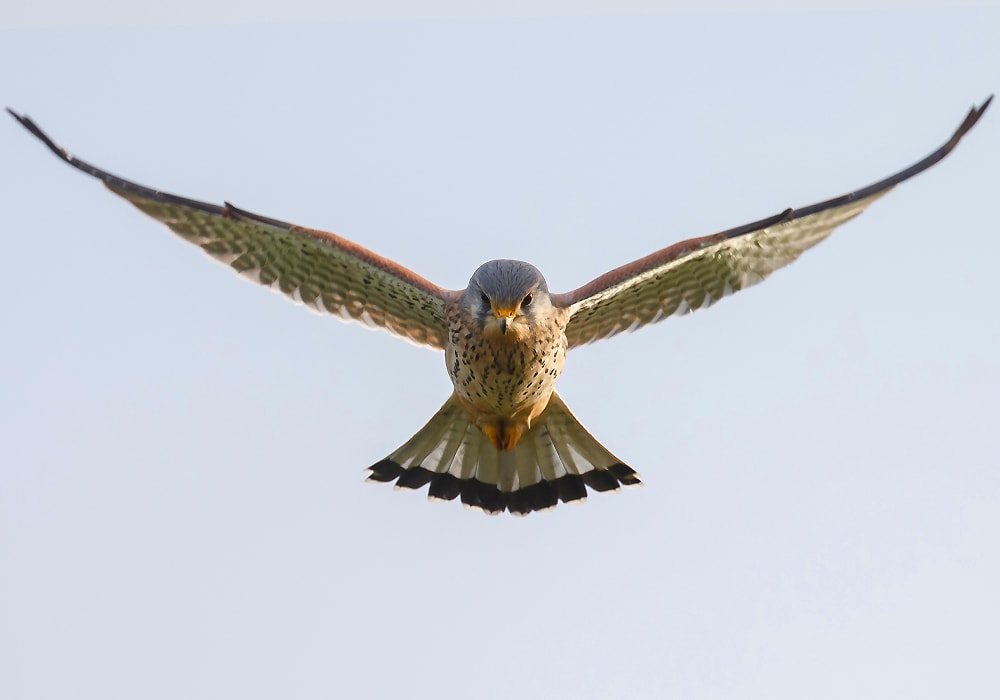
Dreaming of a pair of falcon may represent devotion or romance. Although they spend much of their lives in solitude, falcons do tend to mate for life, so long as their mate is healthy and available. A pair of falcons represents partnership and cooperation.
Dreaming of a hunting falcon may represent vigilance, danger, or perception.
Falcon Encounters and Omens
Encountering a falcon can be a very impactful experience. Falcons are beautiful and very striking animals. At one time, a falcon encounter would be an exceedingly rare occurrence. Currently, falcons have made an impressive recovery. A falcon encounter may be a fantastic reminder of the importance of conservation and the rewards that such efforts can provide.
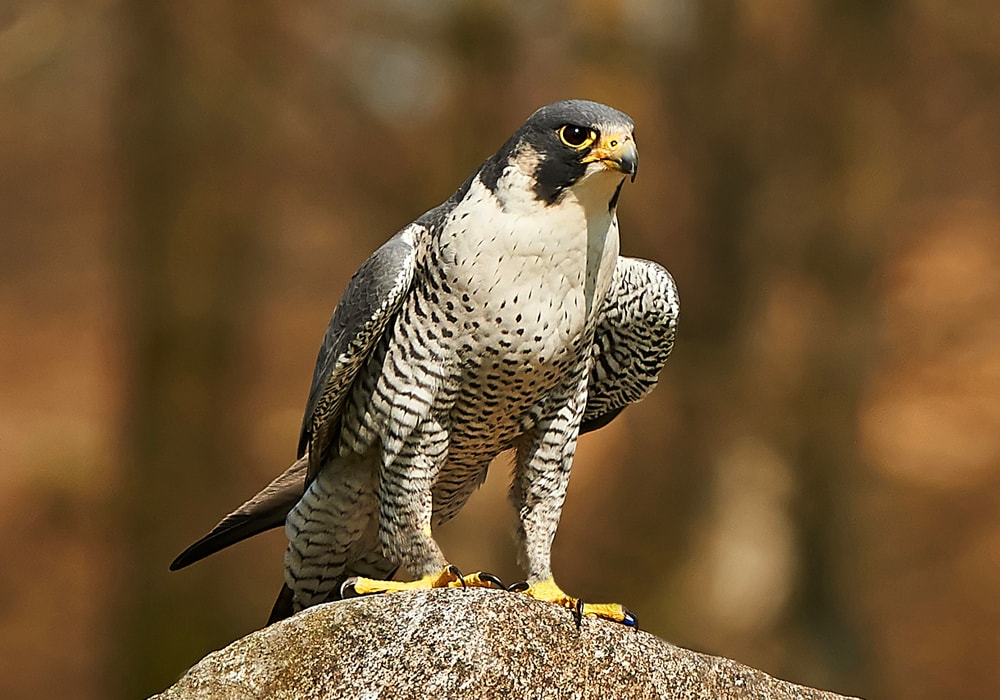
Falcon encounters may also represent protection from danger. (15)
Falcon Mythology and Folklore
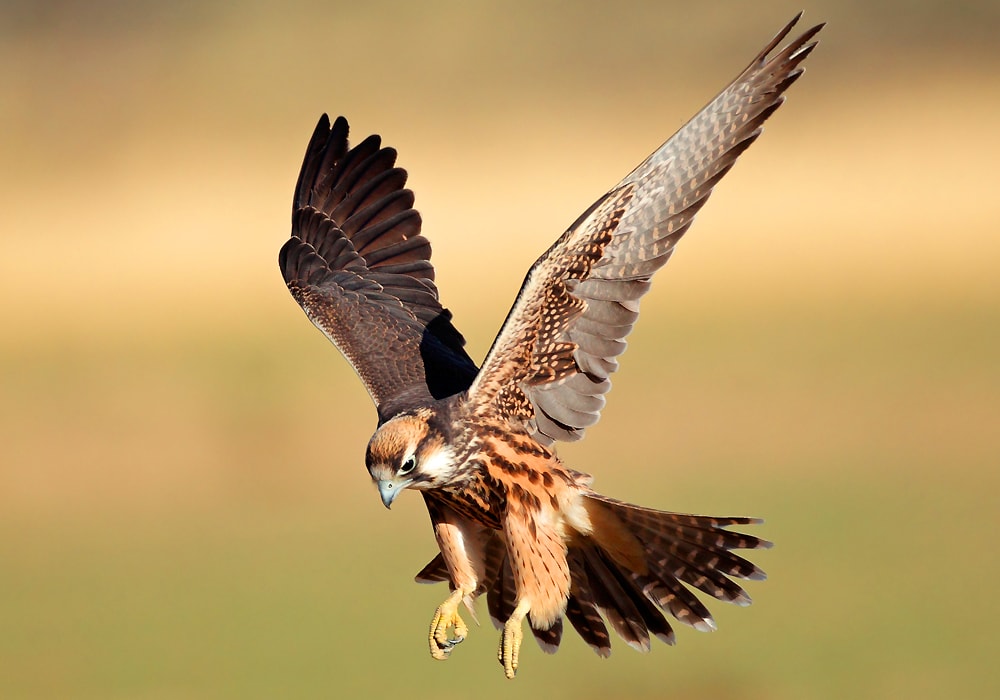
We previously discussed the role of the falcon in Egyptian mythology. Falcons are often connected with Horus. This is not the extent of the role of falcons in Egypt, though. The all-important Egyptian god, Ra, is often depicted as a falcon or a falcon-headed humanoid. Ra is the god of the sun who carries the sun across the sky in a boat each day. Ra is connected with power, kingship, might, and the sun. (16)(17)
Falcon Spirit Animal
If your spirit animal is a falcon then you are likely a high-achieving individual with a focused personality. The falcon spirit animal is the quintessential type-A personality. People with the falcon as their spirit animal are determined and passionate.
The falcon spirit animal is strong-willed and has a very strong work ethic. People with the falcon as their spirit animal are dreamers who expect big things from themselves, however they know how to put in the work in order to live up to their tall expectations. (18)
Falcon Totem Animal
If the falcon is your totem animal then you are likely fearless and proud. The falcon totem animal is unafraid of wheeling and diving through the sky in pursuit of its goals. While most creatures would be fearful diving through the sky at record-smashing speeds, falcons have faith in their abilities and trust their talents to carry them through.
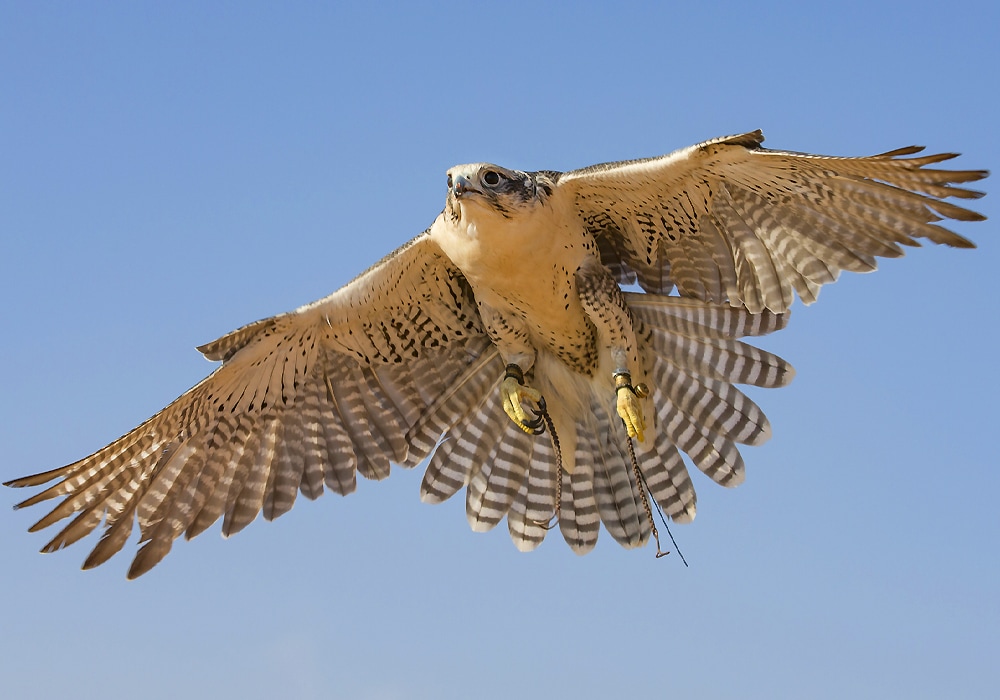
The falcon totem animal is a reminder to have faith in one’s own abilities and to stand on one’s own strength.
Falcon Power Animal
The falcon power animal is connected with vision and foresight. The falcon is known for its incredible vision. People with the falcon as their power animal have an uncanny ability to view events from afar, giving them an especially strong sense of perspective.
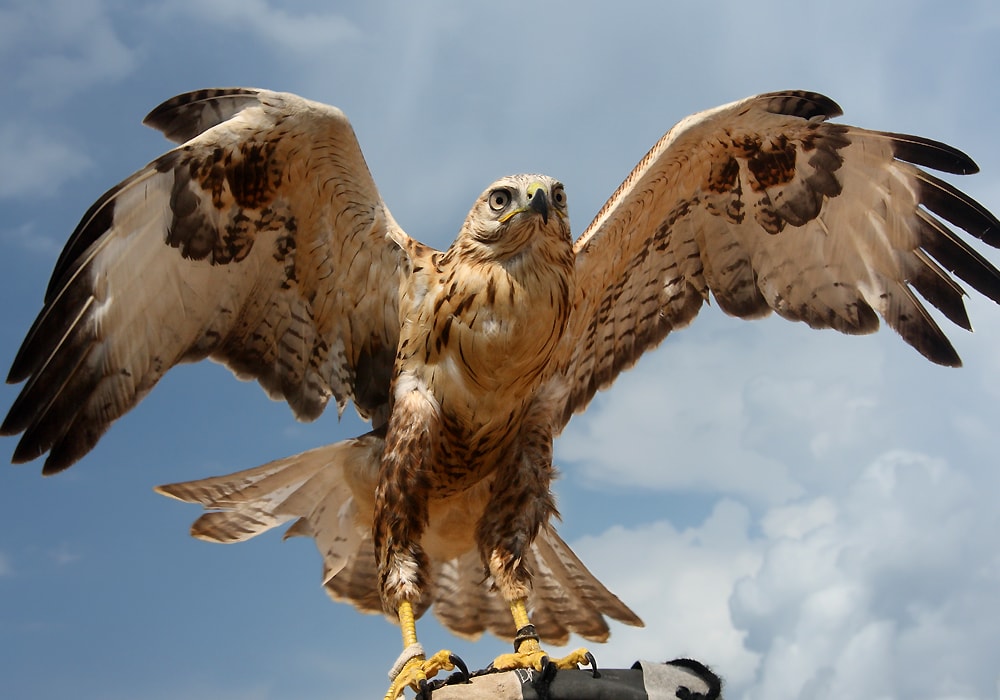
The falcon power animal can be a helpful emblem when it comes to decision-making. The falcon power animal symbolizes the wisdom of long-term planning and forward-thought. (19)
Falcon Tattoo Meaning
A falcon tattoo may represent nobility or the falconry hobby. A tattoo featuring an Egyptian-style falcon or the “Eye of Horus,” may represent protection or wisdom.
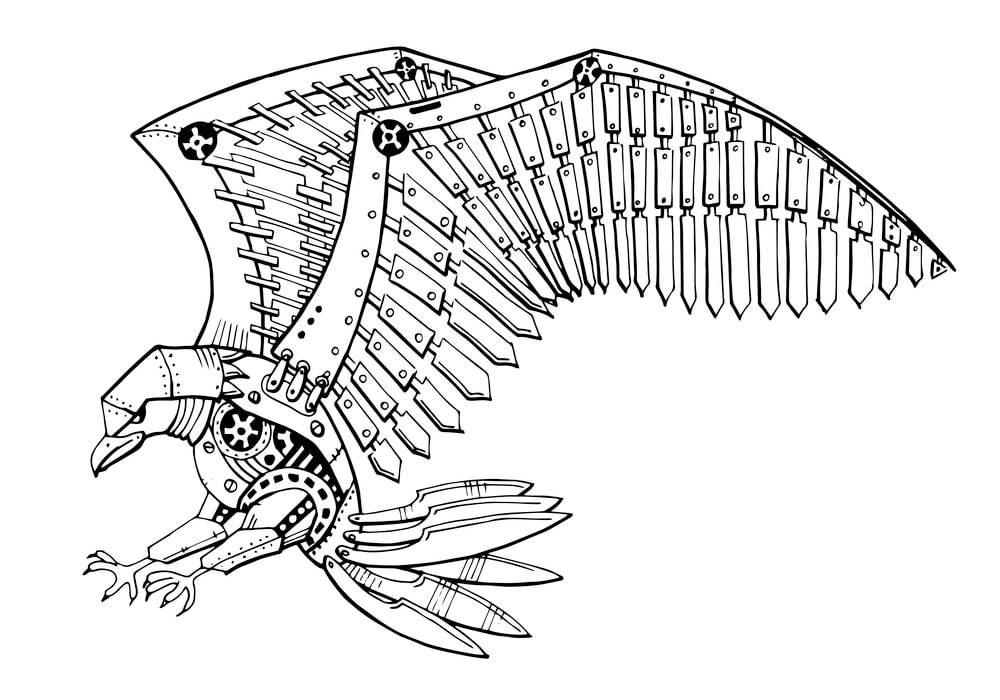
Falcon tattoos may also represent conservation, vision, achievement, or ability.
Conclusion
Falcons are one of humanity’s ancient companions. From ancient Egyptian gods to medieval falconry to modern conservation efforts, falcon populations have long been intertwined with human cultures. Proud and fast, the falcon inspires both awe and wonder in the humans who interact with them.
